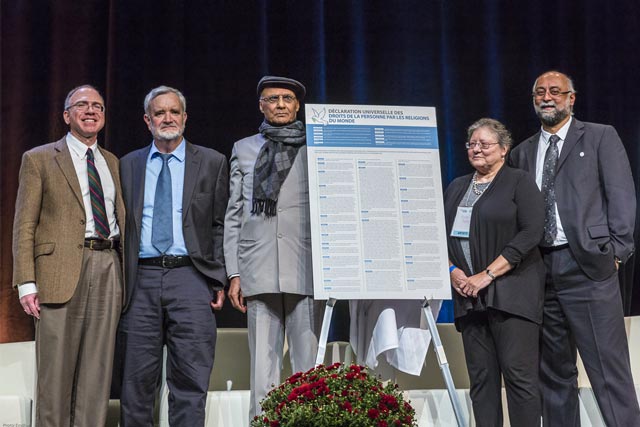Declaration of Human Rights by the World’s Religions issued at global conference
October 3, 2016 2023-08-14 11:53Declaration of Human Rights by the World’s Religions issued at global conference

Declaration of Human Rights by the World’s Religions issued at global conference
Leading religious scholars representing the major world religions have issued a declaration saying it is imperative that religions be a “positive resource for human rights”. The Declaration of Human Rights by the World’s Religions was released 15 September in Montreal, Canada at the 3rd Global Conference on World’s Religions after September 11.
“No-one has the right to employ violence or the threat of violence to advance a religion, religious beliefs, or religious laws,” say the authors of the text, American legal scholar Brian Lepard, theologian Amir Hussain of Loyola Marymount University, Vivian Lee-Nyitray of the University of California, and Daniel Cere and Arvind Sharma of the Faculty of Theology at Canada’s McGill University.
Ironically, only days after the declaration was released, alleged terrorist attacks in three communities in the United States inflamed anger and hostility at acts of violence perpetrated in the name of religion.
Work on a declaration of human rights in the name of the world’s religions began in 1998 at the suggestion of McGill University’s Faculty of Theology. The initiative coincided with celebrations to mark the 50th anniversary of the United Nations Declaration of Human Rights and was intended to create a declaration to complement the UN statement. Early drafts were discussed at academic conferences as well as at a UNESCO conference on inter-religious dialogue in Barcelona in 2002 and by the Parliament of the World’s Religions at its meeting in Durban, Australia in 2009. Nobel Laureate Shirin Ebadi presented a revised version in 2006 at the first Global Conference of World’s Religions after September 11.
The final text released this month in Montreal states that: “Everyone has the right to freedom of thought, conscience, and religion. This right includes freedom to choose, retain or change one’s religion or belief, and freedom, either alone or in a community with others and in public or private, to manifest one’s religion or belief in teaching, practice, worship and observance.”
The 3rd Global Conference on World’s Religions following September 11, held at McGill University and convened by Arvind Sharma, featured a list of high-profile religious academics, activists and writers including Gregory Baum, known for his role as theological advisor to the Ecumenical Secretariat during the Second Vatican Council, celebrated author Karen Armstrong, Indian spiritual leader Sri Sri Ravi Shankar, and professor of Jewish studies Susannah Heschel.
The inaugural Global Conference on World Religions held in Montreal in 2006 was called in response to terrorist attacks on sites in the United States on September 11, 2001. The objective of the conferences has been to address the potential of the world’s religions to be agents of peace at a time when religion has, in Sharma’s words, become a “byword for evil, aggression and terror”. The Montreal event, held under the theme From Faith to Interfaith, was the final conference in the series. Co-sponsors included the Uberoi Foundation for Religious Studies and the Canadian Centre for Ecumenism.
Source: The World Council of Churches








